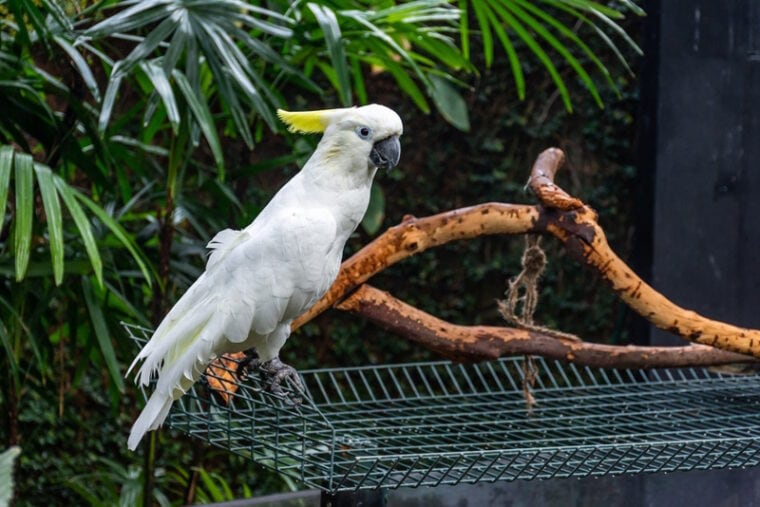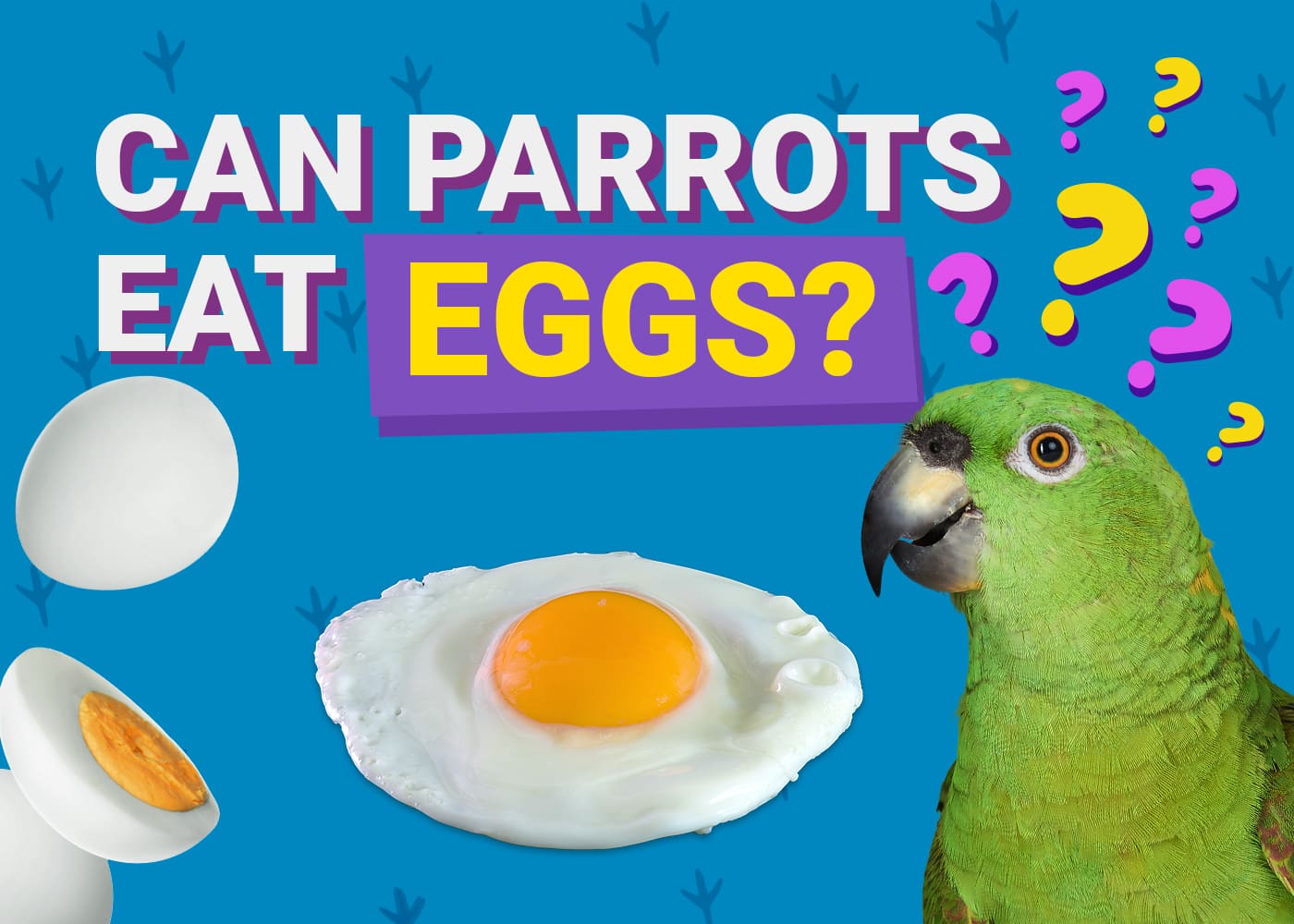
There are few birds as beautiful, stunning, and regal as the Citron-Crested Cockatoo. But do they make excellent pets, and is one right for your home?
Whether you’re interested in purchasing a Citron-Crested Cockatoo or you simply want to learn more about these beautiful birds, you’ve come to the right place. From what they eat to their temperament and what you’ll need to take care of them, we cover everything that you need to know here.
 Species Overview
Species Overview
Origin and History
Originally from tropical forests in Indonesia’s Lesser Sunda Islands and Sumba, Citron-Crested Cockatoos, and their natural habitat are under threat from human intervention.
Trapping for the pet trade has also led to a decline in their natural population, and Endangered Species Act currently classifies them as critically endangered. Today, there are only about 500 to 600 individuals in the wild, down from over 2,000 just 30 years ago.

Temperament
One of the main reasons that the Citron-Crested Cockatoo has become such a popular pet is their loving, curious, and affectionate temperament. They love interacting with their owner, although it will take a bit of time for them to warm up to you. Once they do, they’ll want all your attention all the time. They’re extremely intelligent and playful, which means you can teach them tons of tricks, and you don’t have to worry about them acting out.
However, they require plenty of attention, so if you don’t have a ton of extra time, a Citron-Crested Cockatoo might not be the perfect fit for your home.
Also, keep in mind that while these birds are quieter than many other parrots, they’re still prone to the occasional outburst. These make them unsuitable for apartment living or other locations where you’re close to your neighbors.
Speech & Vocalizations
The Citron-Crested Cockatoo is a parrot, and like many parrots, they can learn a few words and phrases if you train them. However, this isn’t their strong suit compared to other parrots, so don’t expect the best results.
They tend to be relatively quiet, but they can growl and occasionally shriek, especially if they aren’t getting the necessary human interaction that they need to stay happy.
Citron-Crested Cockatoo Colors and Markings
 Caring for the Citron-Crested Cockatoo
Caring for the Citron-Crested Cockatoo
While you might think that it’s relatively easy to care for a bird, that’s certainly not the case with the Citron-Crested Cockatoo. They need tons of human interaction; otherwise, they’ll get extremely loud and destructive when bored.
You need at least a 4′ x 4′ x 4′ cage, but the larger the cage that you can get, the better. They’ll appreciate the extra space to roam around, and an aviary is the ideal setting for a Citron-Crested Cockatoo.
However, as long as you’re getting your Citron-Crested Cockatoo out consistently for extended periods, a cage is perfectly acceptable.
Keep in mind that if you can’t give your Citron-Crested Cockatoo the attention that they crave on any particular day, they might start to act out. Some Citron-Crested Cockatoos respond well to radios, television shows, or music, but this depends on the bird, so don’t rely on these methods.
Besides plenty of human interaction, there are a few other things that you need to be aware of to care for your Citron-Crested Cockatoo properly. From potential health concerns to what you need to feed, we break everything down here.

Common Health Problems
The most common health concern to affect a Citron-Crested Cockatoo is Chlamydia psittaci, also known as Psittacosis. It’s a bacterial infection similar to pneumonia, except for birds.
The best thing that you can do to help prevent this from happening is to take all the proper precautions when handling your bird and to keep up with cage and environmental cleanings. If your Citron-Crested Cockatoo does get sick, you’ll need to take them to a vet so they can get the necessary antibiotics.
Other concerns include emotional problems that can lead to feather-pulling and other self-mutilating behavior. While this can happen to any Citron-Crested Cockatoo, it’s far more common with those that aren’t getting enough interaction from their owners.
Diet and Nutrition
The nutritional requirements of a Citron-Crested Cockatoo are simple and easy but strict. You should feed them about ¼ cup of Cockatoo food and mix in another ¼ cup of fresh fruits and vegetables. You don’t need to be too particular about the fruits and veggies, just be sure not to overdo the sugar amount from fruit.
You can supplement their diet with nuts, seeds, and cooked meats for good behavior and treats, but be sure not to overdo it, as Citron-Crested Cockatoos are susceptible to obesity.
But the occasional treat is good for both behavior training and your Cockatoo’s health, as this gives them a little extra protein and fat to work with.
Exercise
You need to let your Citron-Crested Cockatoo out of their cage for anywhere from 4 to 5 hours a day in order for them to get enough exercise to be both happy and healthy. This is the perfect time to interact with your Citron-Crested Cockatoo because they’ll be able to roam around a bit and play.
Just be sure your Citron-Crested Cockatoo can’t escape the home when you let them out. While they’re not known as escape artists, it’s not best to tempt fate.

Where to Adopt or Buy a Citron-Crested Cockatoo
Due to their higher price tag, it’s unlikely that you’ll be able to find a Citron-Crested Cockatoo in a local pet store. These impressive birds typically cost between $3,000 and $4,000! That doesn’t include any of the other supplies that they need, so these birds aren’t for those on a budget.
When adopting a Citron-Crested Cockatoo, you need to find a reputable breeder, which can take a bit of work. Get the documentation on their parents, because if you end up purchasing a wild Citron-Crested Cockatoo, it’s both illegal and unethical.
You can tell that your bird was born in captivity if it has a CITES certificate, and you shouldn’t purchase a bird that doesn’t have one.
 Final Thoughts
Final Thoughts
While the Citron-Crested Cockatoo might be expensive, when you consider the fact that they can live for up to 50 years, it’s not a bad investment to get a near lifelong companion. Just be sure that you have the time for them because they need tons of love and attention — they won’t be happy as part-time pet!
Featured Image Credit: Karine Pommier Shutterstock

 Species Overview
Species Overview Caring for the Citron-Crested Cockatoo
Caring for the Citron-Crested Cockatoo





